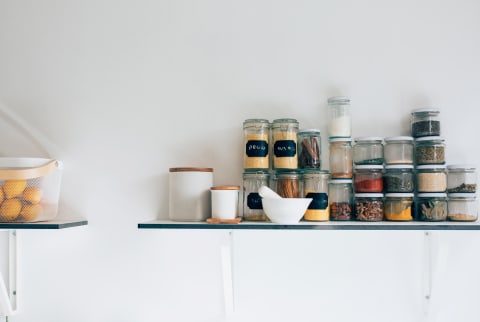Advertisement
4 Foundational Mediterranean Essentials You Should Always Have In Your Kitchen


Mediterranean cooking hinges on wholesome ingredients. For that reason, embarking on an eating journey with this diet often starts with some key swaps or additions to your pantry. We were able to chat with Suzy Karadsheh, founder and chef at The Mediterranean Dish, where she shares recipes and more to make this popular diet accessible, and she shared her must-have items with us.
"The thing about following the Mediterranean diet is a lot of people are wondering about where to start," she told mindbodygreen. "I think having a well-stocked pantry is one of the key ways that you can begin. You need to have those basic building blocks." But that doesn't mean dropping a ton of money in one shopping trip: "I always caution people, you don't need to build your pantry overnight. It will take you some time." Here are some of the items she suggests for getting started—and the ones you should always try to have on hand:
Extra-virgin olive oil
We knew this one was coming, right? Olive oil is a key pillar of Mediterranean cooking and eating. While your local supermarket likely has tons of EVOO options, it's important to be selective about your olive oil to make sure you're getting a bottle with benefits.
"The oils I use are single-estate, from hand-picked olives, organically grown, and cold-pressed," Karadsheh says. "It's really frustrating because the typical grocery store doesn't always have that." Keeping those buzzwords in mind (even if you can't find all of them on a bottle at your local market) can help you ensure you can find a truly high-quality oil, which she explains will also have a higher smoke point than other varieties (making it all right to cook with up to around 400°F).
Shelf-stable vegetarian building blocks
Vegetables are an essential Mediterranean diet macronutrient, as are grains and legumes. “Really we rely a lot on these vegetarian or meatless items in eating the Mediterranean way," Karadsheh explains. "These are such affordable and easy items.
But the specifics? "We use a lot of farro, rice, quinoa, couscous—these are things that don't expire quickly and I always have in my pantry," shares Karadsheh. "We also eat a lot of beans and legumes: chickpeas, white beans, kidney beans, all sorts of lentils—we cook with those almost weekly." And don't shy away from the canned varieties—they're perfectly fine by her book, too.
But truthfully, these items extend beyond just your shelves—all the way to the freezer. "I honestly always buy whatever is available and whatever is in season; it's a key principle of the diet," Karadsheh says. "Frozen is just as well—here in the states we're so lucky to have access to some quality frozen vegetables." Yes, you read that right: frozen veggies!
Frozen seafood
While the food pyramid of the Mediterranean diet may lean heavily on plant-based options, it does also include some meats (especially seafood)—which makes sense, since the diet is named for the region immediately surrounding the Mediterranean Sea. Unfortunately, prioritizing consciously sourced fish can be difficult, which is why Karadsheh will sometimes return to that frozen aisle.
"I wouldn't shy away from buying frozen fish; it's good quality and has been flash-frozen—versus a farmed fish that you look at at the fish counter." Not only that, the fish on the counter has sometimes been frozen for transport, anyway. However, if it's within your means, Karadsheh is a fan of wild-caught fish.
Spices and herbs
Yes, yes, this is technically two groups—but they go hand in hand. This is a section that may take a bit of time to stock up on, but once you've got them, dried herbs and spices will last a few months.
When it comes to fresh herbs, she recommends oregano, parsley, and basil as staples: "These fresh herbs allow you to infuse flavor and use less salt," she adds—and they're herbs you could easily try growing yourself, too.
Diving into a new diet can be overwhelming, but the simplicity of the Mediterranean diet makes it an approachable option for overall health, and one that's easy to slowly introduce to your life. Starting with these key components in your kitchen opens up a plethora of Mediterranean-inspired recipes you can make, maybe even without a trip to the store.